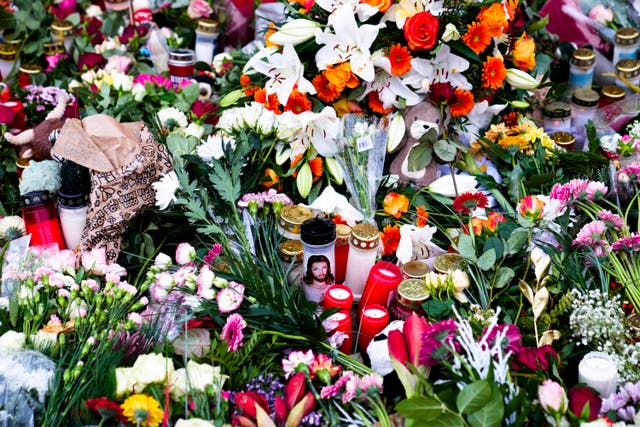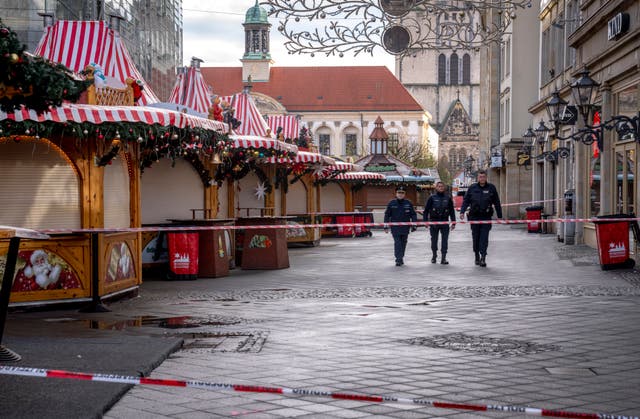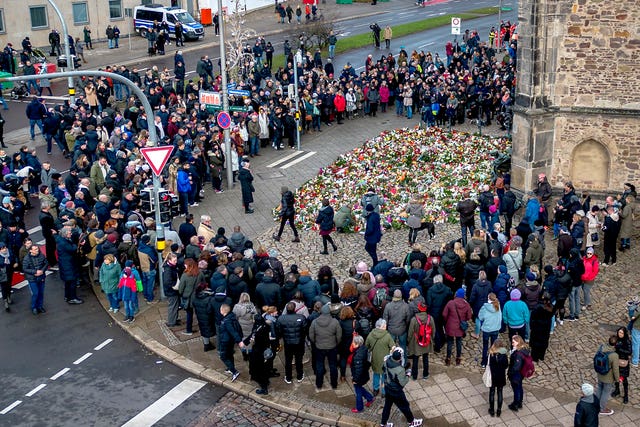Four women and a nine-year-old boy were killed and 200 people were injured when a Saudi doctor allegedly drove into a Christmas market packed with people in the German city of Magdeburg on Friday night.
Here are the key details about what is known about the attack, what German authorities knew about the suspect, and what the incident may mean for elections in the country early next year.
– How did the attack unfold?
Witness Thi Linh Chi Nguyen at first thought the loud bangs were fireworks. The 34-year-old nail technician from Vietnam, whose salon is near the Christmas market, was on the phone during a break when she heard the noise just after 7pm on Friday.
Then she saw a car drive through the market at high speed. People screamed and a child was thrown into the air by the vehicle.
The woman recalled seeing the car bursting out of the market and turning right on to Ernst-Reuter-Allee street and then coming to a standstill at a tram stop where the suspect was arrested.
The market now stands empty and cordoned off by police, with armed officers deployed around it.
Nearby, hundreds of people have stopped to light candles or leave flowers at a growing makeshift memorial.

Police have confirmed those killed were four women, aged 45, 52, 67 and 75, and a boy aged nine. He was named as Andre Gleissner by fire department officials in the Elm-Asse region west of Magdeburg, where he was a member of the children’s fire brigade.
Another 200 people were injured, including 41 who are said to be in serious condition. They are being treated in multiple hospitals in Magdeburg, which is about 80 miles west of Berlin, and beyond.
– Who is the suspect?
Prosecutors said the suspect, a 50-year-old doctor from Saudi Arabia, is under investigation on suspicion of murder, attempted murder and bodily harm.
In a closed-door hearing on Saturday evening, a judge ordered that he be kept in custody pending a possible indictment.
Several German media outlets have identified him only as Taleb A, withholding his last name in line with German privacy laws.
They report he was a specialist in psychiatry and psychotherapy and had lived in Germany since 2006, practising medicine in Bernburg, about 25 miles south of Magdeburg.

He was critical of German authorities, saying they had failed to do enough to combat the “Islamification of Europe”. He has also voiced support for the anti-immigrant Alternative for Germany (AfD) party.
Some described Taleb as an activist who helped Saudi women flee their homeland. Recently, he seemed focused on his theory that German authorities have been targeting Saudi asylum-seekers.
– What was the motive?
Investigators are analysing the suspect’s computers, mobile devices and other evidence, trying to understand what motivated him to drive his black BMW into the crowd.
Prosecutors said the motive may have been “dissatisfaction with the treatment of Saudi refugees in Germany”.
There are unanswered questions about what the authorities knew about the suspect. The head of the Federal Criminal Police Office, Holger Munch, said the agency received a warning from Saudi Arabia in November 2023, but that the information proved to be very unspecific.
Germany’s Federal Office for Migration and Refugees also acknowledged it had received a warning about the suspect last year.

– What has the impact of the attack been so far?
The violence shocked all of Germany, prompting several other towns to cancel their weekend Christmas markets as a precaution and out of solidarity with Magdeburg’s loss. Berlin kept its markets open but increased the police presence.
Germany has suffered several extremist attacks in recent years, including a knife attack that killed three people and injured eight at a festival in the western city of Solingen in August.
Friday’s attack came eight years after an Islamic extremist drove a truck into a crowded Christmas market in Berlin, killing 13 people and injuring many others.
Those attacks have led cities to increase security at Christmas markets and other events.
The horror triggered by yet another act of mass violence in Germany make it likely that migration will remain a key issue ahead of an early election on February 23.
It is the latest in a string of incidents around the world in which vehicles have been used as weapons by jihadi attackers, far-right extremists and others whose motives were unclear.






